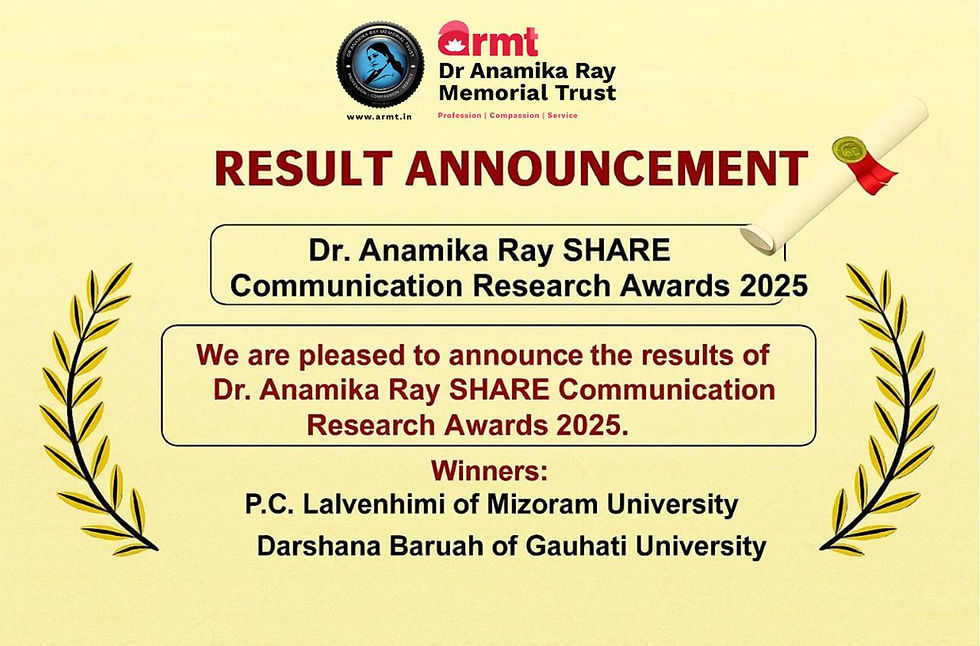100 Years of Radio Broadcasting in South Asia: Democratisation of Airwaves
- Ankuran Dutta

- Dec 29, 2023
- 3 min read
Updated: Dec 31, 2023
29th December 2023: Today the Dr. Anamika Ray Memorial Trust, Guwahati organized an international web symposium commemorating hundred years of radio broadcasting in South Asia. The symposium’s theme was the ‘democratisation of airwaves.’ 30 speakers from across the South Asian region addressed the symposium in four plenary sessions. More than 450 participants from 10 countries registered for the event.

The symposium commenced with a welcome note from the Chairperson of the ARMT, Rajat Baran Mahanta. Following this, the symposium was formally inaugurated by Dr. D. K. Renuka Ekanayake, Director of the SAARC Cultural Centre, Colombo and a senior officer of the Sri Lanka Administrative Service. In her inaugural address, Dr. Ekanayake highlighted how radio has been one of the most important media for disseminating, preserving and popularizing cultures of the South Asian region over the last 100 years. She added that the centenary of radio broadcasting in South Asia is a joyous occasion to celebrate the deep service this medium has performed for humankind.

The history of radio in South Asia was the topic for the first plenary session that was chaired by Prof. K V Nagaraj, the former Pro-Vice Chancellor of Assam University and, Prof. Aparna Sharma of the University of California Los Angeles moderated this session. In June 1923 the Radio Club of Bombay made the first broadcast in India, also the first in the South Asian region. Following this, five months later the Calcutta Radio Club was established. The Indian Broadcasting Company (IBC) came into being on July 23, 1927, and unfortunately it faced liquidation within three years. Five eminent speakers commented on these events and related matters pertaining to the history of radio in South Asia. They included luminaries from the world of Indian public broadcasting: Prof. Ashok Ogra, former Vice President of Discovery Channel (SA); Prof. K. G. Suresh, the Vice Chancellor of Makhanlal Chaturvedi National University of Journalism and Communication (Bhopal) and former Director General Indian Institute of Mass Communication (New Delhi); Prof. Manoj K. Patairiya, former Head, National Council for Science and Technology Communication, the Director of the National Institute of Science Communication and Information Resources and the former Additional Director General of Prasar Bharati; Dr. R. Sreedher, former Director, Commonwealth Educational Media Centre for Asia, founder of Gyan Vaani, Gyan Darshan and the Anna Community Radio Station and senior official of Doordarshan and the All India Radio and; last, Prof. Ujjwal Chowdhury, professor from Daffodil University, Dhaka and former Pro-Vice Chancellor of the Adamas University.

The second plenary session was titled: ‘Radio in South Asia — A Social History of the Golden Age.’ Prof. Padmasiri Wanigasundera, Emeritus Professor from the University of Peradeniya (Sri Lanka) chaired this session and, Pervez Khan, a Fulbright Scholar at the Southern Illinois University served as moderator. Case studies from across South Asia were presented. Masood Ul Hassan Akhtar spoke on radio in Pakistan; Snehashish Sur focussed on the Indian radio experience; Prof. Mohammad Sahid Ullah provided an account of the evolution of radio in Bangladesh, while Suman Basnet’s presentation gave an overview of radio and it challenges in South Asia, with a focus on Nepal.

The third panel discussed radio in the context of digitality and new media. Prof Mrinal Chatterjee from the Indian Institute of Mass Communication chaired this panel and Dr Mausumi Bhattacharyya, Visva Bharati University moderated it. Five speakers offered their views including Prof. Aatish Parashar from the Central University of South Bihar, Dr. Durgesh Tripathi of Indraprastha University, Prof. Padma Rani from the Manipal Institute of Communication, Prof. Shahid Rasool from the Central University of Kashmir and Dr. S. Arulchelvan of Anna University, Chennai.

Prof. Sanjeev Bhanawat, retired from the University of Rajasthan, chaired the last session. This session was moderated by Prof. Sapna M S from the University of Mysore. Six speakers spoke on the future of radio in South Asia. These included: Prof. Aman Vats, Amity School of Film and Drama; Prof. Ambrish Saxena, DME Media School; Prof. Dev Vrat Singh, Central University of Jharkhand; Prof. Sunder Rajdeep, University of Mumbai; Dr. Sweta Singh, Indraprastha University and Dr. Uma Shankar Pandey from the University of Calcutta.
In 2020 the Dr. Anamika Ray Memorial Trust organised a mega, online conference commemorating hundred years of media education in South Asia. The trust is a Guwahati-based NITI Aayog registered educational and research non-profit organization established in 2015 that works on media education and patients’ medical rights.



Comments